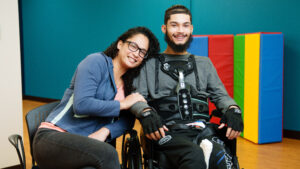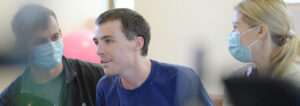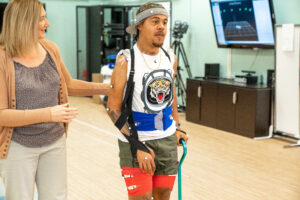Communicating with Aphasia – More than Words

Back to physical health resource hub
Have you ever just blanked on what you were going to say right as you were getting to the good part of the story?
We’ve all been there.
But what if you lived in a world where you always have trouble finding your words. Can you imagine what it would be like if you were suddenly unable to respond quickly in conversations, or even at all?
For many people affected by aphasia, this world is a reality.
The word Aphasia originates from the Greek word “aphatos” which means speechless. It is a language disorder that occurs suddenly after a stroke or brain injury. The interesting thing about aphasia is that it does not affect intelligence; it impacts a person’s ability to talk, understand the spoken word and read or write.
For people with Aphasia, it is important to remember that communication is more than words. Individuals with aphasia must learn new ways to communicate. In addition to relearning how to speak, individuals must learn techniques to communicate that may include using gestures, drawing, facial expressions and using communication boards to get their ideas across.
There is hope. Some of the latest research is showing that individuals with aphasia can continue to improve long after they have had a stroke or injury. Brooks is proud to announce the opening of its comprehensive Aphasia Center in January 2016, which will focus on helping people rejoin the conversation.
A comprehensive aphasia program uses research-based therapeutic techniques to improve communication skills. These therapeutic approaches may include:
- Community based programs for group learning and support
- Speech therapy
- Specialized equipment and communication devices
- Training and support for caregivers
- Coordinated group activities
For more information on the Brooks Rehabilitation Aphasia Center, please contact Jodi Morgan or Flo Singletary at 904-345-6780 or visit our Aphasia Center page.


